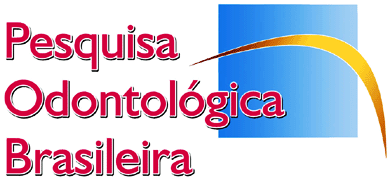The purpose of the present study was to evaluate the influence of different disinfectant solutions on the tensile bond strength of a fourth generation dentin bonding agent. Forty non carious human molars were selected. Teeth were embedded in acrylic resin and ground until the exposure of a flat superficial dentin surface. Teeth were randomly divided in 4 groups and treated as follows: Group 1 - 2.5% NaOCl for 40 seconds; Group 2 - 2% chlorhexidine for 40 seconds; Group 3 - 1.23% acidulated fluoride for 4 minutes; and Group 4 - control (without disinfectant solution). Following treatments, Scotchbond Multipurpose Plus® (3M) was used according to the manufacturer’s instructions. After that, the test specimens were built with composite resin (Z100®-3M), using a standard Teflon matrix. The specimens were stored in distilled water for 24 hours at a temperature of 37ºC. The tensile strength test was performed using a Mini Instrom testing machine. The mean values obtained for each group, in MPa, were: Group 1 - 7.37 (± 2.51); Group 2 - 11.25 (± 4.65); Group 3 - 9.80 (± 3.11); and Group 4 - 10.96 (± 3.37). The results were submitted to statistical analysis using the ANOVA test, and no statistical significant differences among the groups were found. It can be concluded that the different disinfectant substances used in this research do not adversely affect dentin adhesion.
Dentin-bonding agents; Smear layer; Disinfectants

